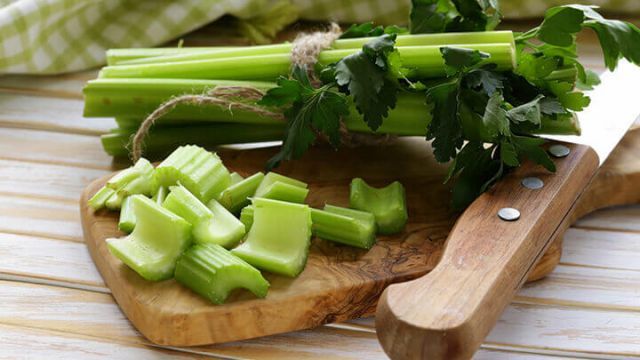
There’s a misconception floating around that celery is no more than a crunchy, low-calorie food used to alleviate hunger. But nothing could be further from the truth. A humble stalk of celery — often reserved for dieting — has many health benefits, including blood pressure and cardiovascular benefits.
The silent killer
Every time your heart beats, it pumps blood into the vessels, carrying blood throughout the body. The force of blood pushing against the arteries as it is pumped by the heart defines blood pressure. The bottom line, the higher the pressure, the harder the heart has to pump.
Normal adult blood pressure is about 120/80. The top number represents the amount of pressure in your arteries during contraction of your heart muscle (systolic pressure), and the bottom number represents when the heart relaxes (diastolic pressure). Anything above 140/90 generally suggests high blood pressure. And of course, the higher the blood pressure, the higher the risk of damage to the heart, blood vessels and major organs such as the brain and kidneys.
But most people with high blood pressure have no symptoms at all, which is why it’s often called the “silent killer.” Sometimes, though, hypertension can cause symptoms such as headaches, shortness of breath, dizziness, chest pain, palpitations and nose bleeds. Here’s the thing: if left uncontrolled, high blood pressure may lead to a heart attack, an enlarged heart and eventually heart failure. Blood vessels could even develop aneurysms and weak spots, making them more susceptible to clogging and bursting. Additionally, high blood pressure may cause blood to leak into the brain and cause a stroke. If left untreated, hypertension could also lead to kidney failure and blindness. So how can we reduce blood pressure naturally? With celery, of course!
Celery for blood pressure
In recent pharmacological studies, celery proves to have both antioxidant and anti-inflammatory properties that help improve blood pressure, cholesterol levels and prevent heart disease, according to Dr. Josh Axe.
A number of foods contain antihypertensive compounds and celery, in particular, contains a compound that is not only responsible for the characteristic odor but also proves to lower blood pressure, according to a pilot study published in Natural Medical Journal.
The study found that just a small amount of the celery compound lowered blood pressure by 12 to 14 percent and cholesterol by about 7 percent in animals. While the study showed that celery extract helps prevent stroke, improve blood flow, protect the brain and enhance energy production in animals, researchers also found evidence that may support actually eating the whole celery to alleviate high blood pressure.
Researchers found that when one of the animals ate a quarter-pound of celery each day for one week, its blood pressure dropped from 158/96 to 118/82. Celery acts as both a diuretic and vasodilator (widens blood vessels). The study also shows that celery may lower blood cholesterol levels and reduce the formation of arterial plaque. This, in turn, may also increase the elasticity of the blood vessels and lead to lower blood pressure.
Celery contains a phytochemical called phthalides (the active compound in the chemical composition of celery). As an extract, it’s called NBP, and it’s known to relax the tissues of the artery walls to increase blood flow and reduce blood pressure. But rather than just the extract, eating the whole food is better, according to Dr. Kenneth Shafer in the department of cardiovascular medicine at Cleveland Clinic. Whole celery is low in salt, high in fiber, magnesium and potassium, which also helps regulate blood pressure. “To get the benefit, you should eat roughly four stalks — one cup, chopped — of celery daily,” suggests Dr. Shafer.
The many other health benefits of celery
Apart from blood pressure benefits, celery is also an excellent source of antioxidants and beneficial enzymes. In addition, celery contains vitamins and minerals including vitamin K, vitamin C, potassium, folate and vitamin B6. And unlike other vegetables, even when celery is steamed, blanched or boiled, it loses very little of its nutrients.
Not surprisingly, celery is a great veggie to snack on when watching your weight. One stalk contains only 10 calories. But it doesn’t stop there — celery also supplies a whole host of benefits such as:
- It reduces inflammation. Therefore, anyone suffering from joint pains, lung infections, asthma and acne with find relief by eating celery.
- Celery helps keep you calm. The minerals it contains, particularly the magnesium, soothes the nervous system. So have a celery stalk before bed for better sleep.
- It helps balance your body’s alkaline.
- Celery aids digestion.
- The high water content of celery, combined with the insoluble fiber, makes it a great source for passing stool. But because of its diuretic qualities, you may want to skip it if you’re suffering from diarrhea.
- Celery contains good sodium. While avoiding salt in important for heart health, the sodium in celery is actually good for you. Unlike table salt, it’s organic, natural and essential for health.
- It’s good for your eyes. One large stalk of celery gives you five percent of daily Vitamin A, which helps protect the eyes and prevents age-related vision problems.
- Celery may help reduce “bad” cholesterol. Butylphthalide, a component in celery which gives it its flavor and scent, also reduces cholesterol.
- Celery may help fight certain cancers. Two studies at the University of Illinois showed that a powerful flavonoid in celery, called luteolin, actually inhibits the growth of cancer cells, especially in the pancreas.
One cup of celery has approximately 16 calories, zero grams of fat, one gram of protein and five grams of fiber. It’s important to note that while most people enjoy eating celery stalks, the leaves and seeds are also edible and highly beneficial for your health. So for better health and lower blood pressure, add celery to your soups, salads, sandwich fillings or simply enjoy as a midday snack — it’s not just for dieting anymore.
— Katherine Marko

